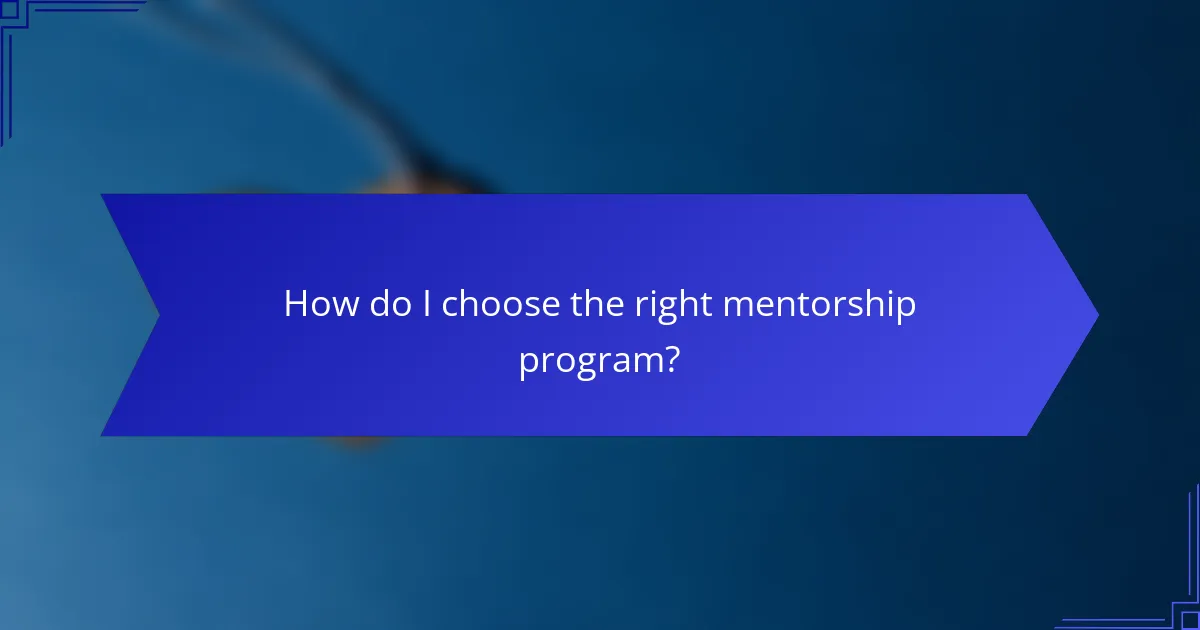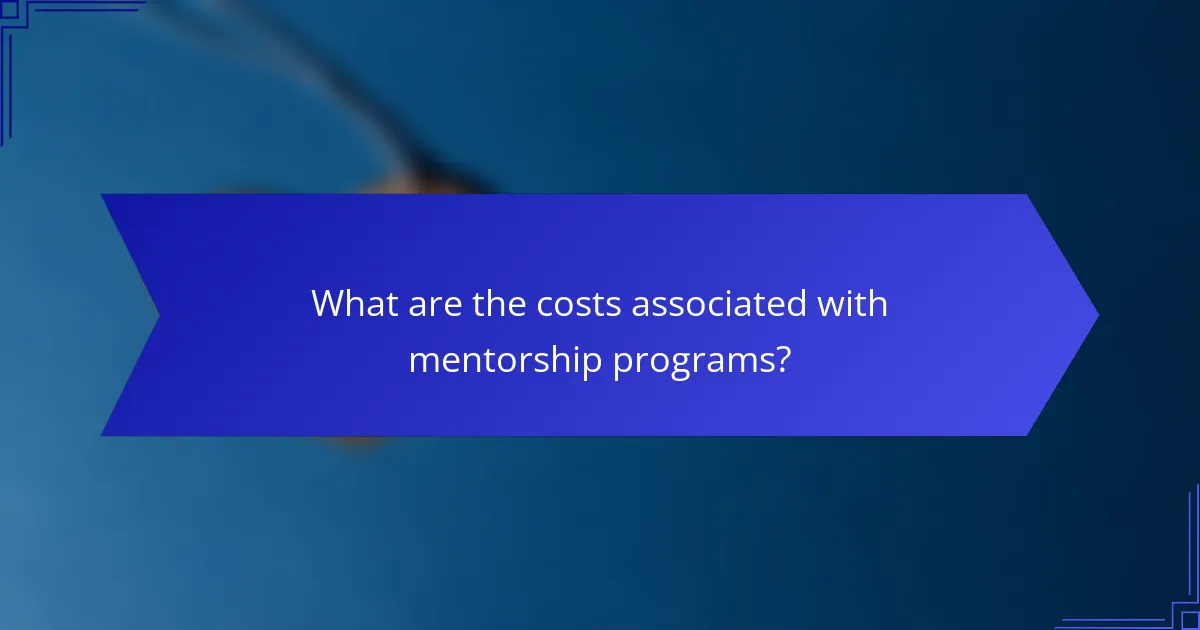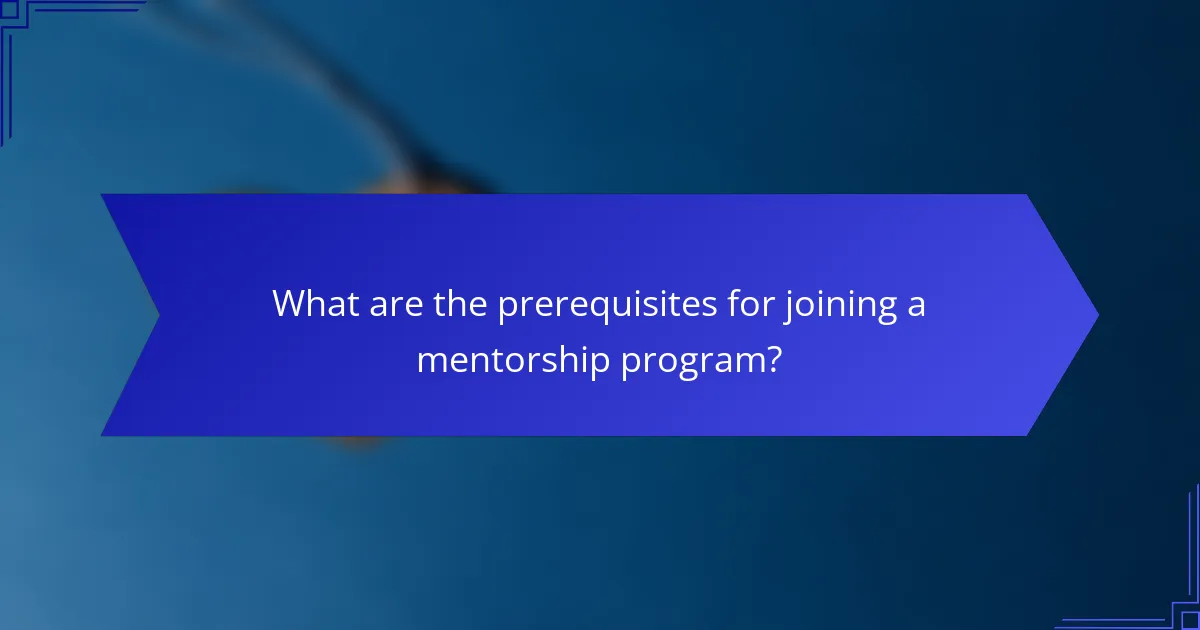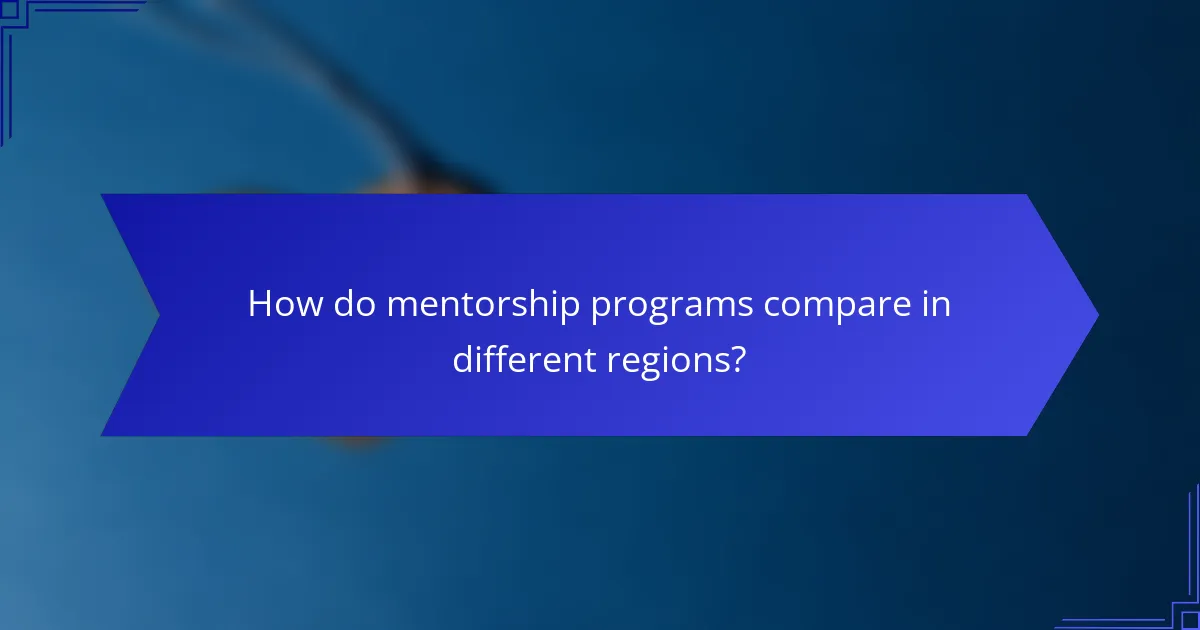Online platforms for discovering creative mentorship programs provide aspiring creatives with access to experienced mentors across diverse fields. These platforms facilitate structured guidance and networking opportunities, helping individuals align their personal and professional goals with the right mentorship experience.

What are the best online platforms for creative mentorship programs?
The best online platforms for creative mentorship programs connect aspiring creatives with experienced mentors across various fields. These platforms offer structured guidance, networking opportunities, and resources tailored to individual needs.
MentorCruise
MentorCruise is a platform that pairs mentees with mentors in tech and creative industries. Users can browse profiles, read reviews, and select mentors based on their expertise and availability.
Consider the subscription model, where mentees pay for mentorship sessions. This can range from one-time payments for specific sessions to ongoing monthly subscriptions, depending on the mentor’s offerings.
GrowthMentor
GrowthMentor focuses on marketing and growth-related mentorship. It allows users to connect with experienced professionals who can provide insights into scaling businesses and enhancing marketing strategies.
Users can book one-on-one calls or participate in group sessions. The platform emphasizes actionable advice, making it suitable for those looking to implement strategies quickly.
ADPList
ADPList is a free platform that connects mentees with mentors from diverse creative backgrounds. It emphasizes accessibility, allowing users to find mentors based on specific skills or industries.
Mentorship sessions can be scheduled at the mentee’s convenience, and the platform encourages feedback to improve the matching process. This makes it a great option for those seeking informal guidance.
Skillshare
Skillshare offers a variety of creative courses, but it also features mentorship opportunities through community projects and peer feedback. Users can engage with instructors and fellow students for guidance.
This platform is ideal for those who prefer a structured learning environment while still accessing mentorship. Consider the subscription fee, which provides unlimited access to courses and community features.
LinkedIn Learning
LinkedIn Learning provides a vast library of courses across numerous creative fields, along with opportunities to connect with industry professionals. While not a dedicated mentorship platform, it facilitates networking through LinkedIn.
Users can leverage their LinkedIn profiles to seek out mentors after completing courses. This approach allows for a blend of self-paced learning and professional networking, making it a versatile choice.

How do I choose the right mentorship program?
Choosing the right mentorship program involves aligning your personal and professional goals with the expertise of potential mentors and the structure of the program. Consider what you want to achieve and how the program can facilitate that journey.
Assess your goals
Start by clearly defining your objectives. Are you looking to enhance specific skills, expand your network, or gain industry insights? Knowing your goals will help you identify programs that cater to your needs.
Consider creating a list of short-term and long-term goals. For example, a short-term goal might be to learn a new software tool, while a long-term goal could involve advancing to a leadership position. This clarity will guide your program selection.
Evaluate mentor expertise
Research the backgrounds of potential mentors to ensure their expertise aligns with your goals. Look for mentors who have relevant experience in your field or specific skills you wish to develop.
Check their professional achievements, past mentorship experiences, and any reviews or testimonials from previous mentees. This information can help you gauge their ability to provide valuable guidance.
Consider program structure
The structure of a mentorship program can significantly impact its effectiveness. Look for programs that offer a clear framework, including regular meetings, goal-setting sessions, and feedback opportunities.
Some programs may provide one-on-one mentorship, while others might include group sessions or workshops. Decide which format suits your learning style best. Additionally, consider the duration of the program and the time commitment required from both you and the mentor.

What are the costs associated with mentorship programs?
The costs of mentorship programs can vary widely based on the type of program and its structure. Understanding these costs is essential for choosing a mentorship option that fits your budget and needs.
Free options available
Many online platforms offer free mentorship programs, making them accessible to a broad audience. These programs often include community forums, group mentoring sessions, and resources like webinars or articles.
Examples of free options include platforms like Meetup, where local mentors may host free events, and various nonprofit organizations that connect mentors and mentees at no cost. However, the availability of personalized guidance may be limited compared to paid options.
Subscription-based models
Subscription-based mentorship programs typically charge a monthly or annual fee, providing ongoing access to resources and mentorship. Prices can range from around $10 to $100 per month, depending on the platform and the level of service offered.
These models often include features like one-on-one sessions, exclusive content, and networking opportunities. When considering a subscription, evaluate the frequency of mentorship interactions and the quality of the resources provided to ensure it meets your needs.
One-time fees for workshops
Some mentorship programs charge one-time fees for specific workshops or intensive sessions. These fees can vary significantly, often ranging from $50 to several hundred dollars, depending on the duration and expertise of the mentors involved.
Workshops typically focus on particular skills or topics, providing concentrated learning experiences. Before committing, check the credentials of the mentors and read reviews from past participants to gauge the value of the workshop.

What are the benefits of joining a mentorship program?
Joining a mentorship program offers numerous advantages, including enhanced professional growth, networking, and personalized support. These programs connect individuals with experienced mentors who can guide them through their career paths and skill development.
Networking opportunities
Mentorship programs provide valuable networking opportunities that can lead to new connections and collaborations. Engaging with mentors and their networks can open doors to job prospects, partnerships, and industry insights.
Building relationships through mentorship can lead to introductions to other professionals, which is essential in many fields. Consider attending networking events or workshops organized by the program to maximize these opportunities.
Skill development
Participating in a mentorship program significantly enhances skill development by providing access to expert knowledge and practical experience. Mentors can offer tailored advice and resources that align with your specific goals and challenges.
Focus on setting clear objectives for what skills you want to develop. Regular check-ins with your mentor can help track progress and adjust your learning path as needed. Look for programs that offer hands-on projects or real-world applications to reinforce learning.
Personalized guidance
One of the key benefits of mentorship is the personalized guidance that mentors provide. Unlike generic courses, mentorship allows for tailored advice based on your unique circumstances and aspirations.
To make the most of this guidance, be open about your goals and challenges. Prepare questions and topics for discussion ahead of meetings to ensure you receive the most relevant insights. Remember, the more you engage, the more you will benefit from the mentor’s experience.

What are the prerequisites for joining a mentorship program?
Joining a mentorship program typically requires a combination of basic skills, a commitment to personal growth, and an openness to feedback. Understanding these prerequisites can help you assess your readiness and enhance your chances of a successful mentorship experience.
Basic skills assessment
A basic skills assessment helps determine your current abilities and areas for improvement. This can involve self-reflection, feedback from peers, or formal evaluations in your field of interest. For example, if you’re pursuing a mentorship in graphic design, you might assess your proficiency in design software and your understanding of design principles.
Consider creating a checklist of essential skills relevant to your desired mentorship. This can include technical skills, soft skills like communication, and industry-specific knowledge. Identifying gaps can guide your preparation and discussions with potential mentors.
Commitment to learning
A strong commitment to learning is crucial for maximizing the benefits of a mentorship program. This means being open to new ideas, willing to take constructive criticism, and actively engaging in the learning process. Mentorship often involves setting goals and working towards them collaboratively with your mentor.
To demonstrate your commitment, consider setting aside dedicated time each week for mentorship activities, such as meetings, skill practice, or project work. This not only shows your seriousness but also helps you stay on track and make the most of the mentorship experience.

How do mentorship programs compare in different regions?
Mentorship programs vary significantly across regions due to cultural, economic, and educational factors. Understanding these differences can help individuals choose the most suitable program for their needs and goals.
North America
In North America, mentorship programs often emphasize networking and professional development. Many organizations, such as universities and industry associations, offer structured mentorship opportunities that connect mentees with experienced professionals. These programs typically focus on skill-building and career advancement.
For example, in the United States, mentorship initiatives in tech industries frequently include workshops and networking events, providing a platform for mentees to gain insights and make valuable connections. Participants can expect to invest several hours a month in meetings and activities.
Europe
European mentorship programs tend to be more diverse, reflecting the continent’s varied cultures and languages. Many countries have government-supported initiatives aimed at fostering entrepreneurship and innovation. These programs often include elements of coaching and peer mentoring, in addition to traditional one-on-one mentorship.
For instance, in Germany, mentorship programs may focus on specific sectors, such as engineering or creative industries, and often involve collaboration with local businesses. Participants might engage in both formal sessions and informal meetups, allowing for a blend of structured guidance and organic relationship building.
Asia
In Asia, mentorship programs are frequently influenced by hierarchical cultural norms, where seniority plays a significant role. Many mentorships are informal, relying on personal connections rather than structured programs. However, there is a growing trend towards formal mentorship initiatives, particularly in urban areas.
In countries like Singapore, mentorship programs are increasingly offered by educational institutions and corporations, focusing on skill development and career guidance. These programs often require a commitment of several months, with regular check-ins and progress assessments to ensure mentees are on track.
Australia
Australian mentorship programs often emphasize inclusivity and diversity, aiming to support underrepresented groups in various industries. Many organizations provide structured mentorship frameworks that encourage knowledge sharing and personal development.
For example, programs in the creative sector may pair emerging artists with established professionals, facilitating collaboration and skill enhancement. Participants typically meet monthly, allowing for ongoing support and feedback throughout the mentorship journey.